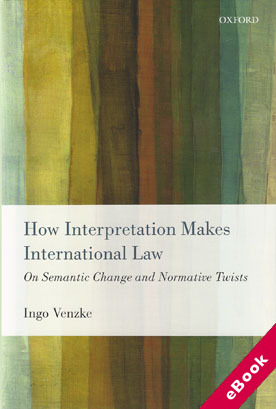
The device(s) you use to access the eBook content must be authorized with an Adobe ID before you download the product otherwise it will fail to register correctly.
For further information see https://www.wildy.com/ebook-formats
Once the order is confirmed an automated e-mail will be sent to you to allow you to download the eBook.
All eBooks are supplied firm sale and cannot be returned. If you believe there is a fault with your eBook then contact us on ebooks@wildy.com and we will help in resolving the issue. This does not affect your statutory rights.
Challenging the classic narrative that sovereign states make the law that constrains them, this book argues that treaties and other sources of international law form only the starting point of legal authority. Interpretation can shift the meaning of texts and, in its own way, make law.
In the practice of interpretation actors debate the meaning of the written and customary laws, and so contribute to the making of new law. In such cases it is the actor's semantic authority that is key - the capacity for their interpretation to be accepted and become established as new reference points for legal discourse.
The book identifies the practice of interpretation as a significant space for international lawmaking, using the key examples of the UN High Commissioner for Refugees and the Appellate Body of the WTO to show how international institutions are able to shape and develop their constituent instruments by adding layers of interpretation, and moving the terms of discourse.
The book applies developments in linguistics to the practice of international legal interpretation, building on semantic pragmatism to overcome traditional explanations of lawmaking and to offer a fresh account of how the practice of interpretation makes international law. It discusses the normative implications that arise from viewing interpretation in this light, and the implications that the importance of semantic changes has for understanding the development of international law.
The book tests the potential of international law and its doctrine to respond to semantic change, and ultimately ponders how semantic authority can be justified democratically in the normative pluriverse of sovereign legal systems.